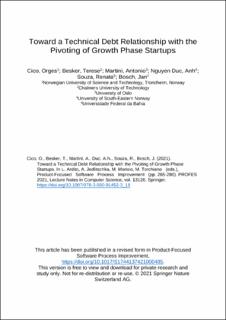Toward a Technical Debt Relationship with the Pivoting of Growth Phase Startups
Chapter
Accepted version
Permanent lenke
https://hdl.handle.net/11250/3105836Utgivelsesdato
2021Metadata
Vis full innførselSamlinger
- Institutt for økonomi og it [152]
- Publikasjoner fra CRIStin [3416]
Originalversjon
Cico, O., Besker, T., Martini, A., Duc, A.N., Souza, R., Bosch, J. (2021). Toward a Technical Debt Relationship with the Pivoting of Growth Phase Startups. I L. Ardito, A. Jedlitschka, M. Morisio, M. Torchiano (Red.), Product-Focused Software Process Improvement (s. 265-280). PROFES 2021, Lecture Notes in Computer Science, vol. 13126. Springer.Sammendrag
Context: Pivot has been a common strategical tactic of startups by shifting course of actions to adapt to environmental changes to the companies. Among many factors influencing the decisions of pivot or preserve, technical characteristics of the product and its evolution are possible triggering factors. We have learned that technical debt is an inherent phenomenon in startups that hinders later growth. However, we do not yet know how technical debt might lead to pivoting in startups and what TD processes we observe in different pivoting scenarios. Aim: Our goal is to evaluate how technical debt influences pivoting in growth-phase startups. Methodology: We conducted an empirical study on 11 software startups in Norway and Brazil and analyzed qualitative data using thematic analysis. Results: We identified three ways that technical debt influences pivoting: (1) direct, (2) indirect, and (3) no-influence. Managing and avoiding technical debt significantly reduces the likelihood of technology pivoting and restrains indirect effects on other pivoting types. Contribution: Our study will enable practitioners to address the influence of technical debt on pivoting in growth-phase software startups. Future researchers can benefit from our findings by conducting exploratory studies and providing educated recommendations.
